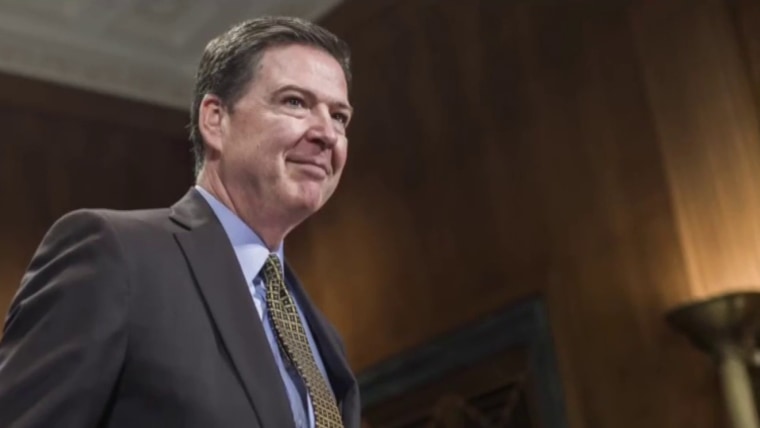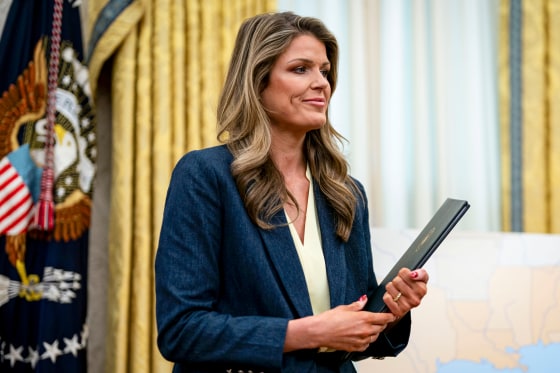ALEXANDRIA, Va. — When acting U.S. Attorney Lindsey Halligan walked into federal court in Virginia Thursday morning, it was Halligan — not the criminal defendants she hopes to prosecute — at the center of the court’s attention.
Former FBI Director James Comey and New York Attorney General Letitia James, both frequent targets of President Donald Trump, filed separate motions in their respective cases, arguing that Halligan is unlawfully serving as acting U.S. attorney and therefore the indictments against them should be thrown out. In a rare joint hearing, attorneys for Comey and James are arguing this together before U.S. District Judge Cameron Currie, who is traveling up from the District of South Carolina.
Halligan presented the cases against Comey and James to grand juries on her own, and was the only person to sign off on their indictments. Lawyers for Comey and James contend that because her appointment was unlawful, she was essentially a private citizen at the time, and the indictments against them should be tossed.
“When the only person presenting to the grand jury lacks government authority, it’s a fundamental error,” Comey attorney Ephraim McDowell told the judge.
Justice Department attorney Henry Whitaker attempted to shrug off questions surrounding Halligan's appointment.
This is “at best, a paperwork error,” Whitaker said.
Currie is hearing this joint oral argument session, not a judge from the Eastern District of Virginia, to avoid any potential intradistrict conflict of interest.
Halligan, who was part of Trump’s legal team in the Mar-a-Lago classified documents case but has no prior prosecutorial experience, was sworn in to the job as interim U.S. attorney in one of the nation’s busiest federal court districts on Sept. 22. That’s three days after Erik Siebert, the U.S. attorney who had been serving in the role since Jan. 21, resigned after being pressured to indict Comey and James.
The indictments against Comey and James came after Trump publicly urged Attorney General Pam Bondi to take action against Comey, James and another of the president’s adversaries, Sen. Adam Schiff, D-Calif. Comey and James both pleaded not guilty to their respective charges.
“We can’t delay any longer, it’s killing our reputation and credibility,” the president wrote in a Sept. 20 Truth Social post. “JUSTICE MUST BE SERVED, NOW!!!”
Critics say that the indictments are part of a troubling pattern of Trump going after his perceived political foes. John Bolton, who served as national security adviser during Trump's first term but has since become a staunch opponent of the president, was also indicted in October.

According to federal statute, individuals may only serve for 120 days after being appointed U.S. attorney, unless confirmed by the U.S. Senate before then. The Senate had not confirmed him, but district judges of the Eastern District of Virginia exercised their own independent appointment authority to legally retain Siebert as an interim U.S. attorney beyond the 120-day limit.
It is that 120-day limit that James and Comey’s attorneys argue should not start back at zero with the appointment of Halligan.
James attorney Abbe Lowell told the judge the 120-day period is designed to give a new president leeway “for a limited period of time to get the office moving.”
In a court filing, Comey attorney Patrick Fitzgerald wrote, “If the Attorney General could make back-to-back sequential appointments of interim U.S. Attorneys, the 120-day period would be rendered meaningless, and the Attorney General could indefinitely evade the alternate procedures that Congress mandated.”
Comey was charged in late September with making a false statement to Congress during a September 2020 Senate Judiciary Committee hearing. Asked by Sen. Ted Cruz, R-Texas, about testimony he gave in 2017 asserting that he did not authorize the leak of information to the media about an FBI investigation into the Clinton Foundation, Comey said, “I stand by the testimony.”
Trump first clashed with Comey during his first term over the then-FBI director's handling of the federal investigation Trump campaign's alleged ties to Russia. Comey was fired in May 2017 and has been an outspoken critic of Trump since then.
The Justice Department laid out in court papers that it believes the indictment of Comey — signed only by Halligan and unsealed days before the five-year statute of limitations expired — should survive this challenge to Halligan’s appointment regardless of what Currie decides because of U.S. Code 3288, the statute that governs this very issue.
“Whenever an indictment or information charging a felony is dismissed for any reason after the period prescribed by the applicable statute of limitations has expired, a new indictment may be returned in the appropriate jurisdiction within six calendar months of the date of the dismissal of the indictment or information,” the statute reads in part.
This six-month grace period, legal experts tell NBC News, may be the DOJ’s key to a continued prosecution of the former FBI director. The bank fraud charge that James, who sued Trump and his businesses for fraud in 2022, is facing is well within the 10-year statute of limitations.
Bondi has taken steps in recent weeks to shore up Halligan’s position.
On Oct. 31, Bondi issued a formal order retroactively appointing Halligan to the position of “special attorney” within the Department of Justice as of Sept. 22 — three days before Comey was indicted — and wrote, “Should a court conclude that Ms. Halligan’s authority as Special Attorney is limited to particular matters, I hereby delegate to Ms. Halligan authority as Special Attorney to conduct and supervise the prosecutions” of Comey and James.
Halligan is also facing several Bar Association complaints in Florida and Virginia, filed by the left-leaning watchdog group Campaign for Accountability.
“Ms. Halligan’s actions appear to constitute an abuse of power and serve to undermine the integrity of the Department of Justice (DOJ) and erode public confidence in the legal profession and the fair administration of justice,” the complaint says.
Several other U.S. attorneys appointed by Trump are also facing legal challenges to their appointments.
In late September, a federal judge in Nevada ruled that acting U.S. Attorney Sigal Chattah should be disqualified from serving in that role due to violating the Federal Vacancies Reform Act.
In August, a federal judge in New Jersey ruled that Alina Habba was “not lawfully holding the office of United States Attorney” due to the 120-day interim appointment expiration, and that her actions since July as the top federal prosecutor in New Jersey may be declared void.


